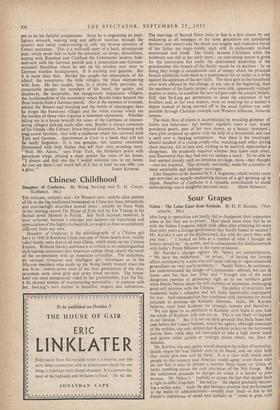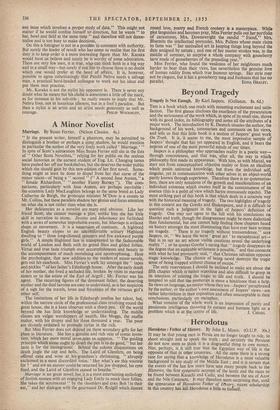Sour Grapes
MEN long in opposition can hardly fail to disappoint their supporters when at last they are in power. How much more must this be so with the Indian Congress, which took office after criticising for more than sixty years a foreign government they hardly hoped to succeed I Mr. Karaka is one of the disillusioned, less with the party than with one man : " I looked on him as a symbol of what I thought an Indian should be," he writes, and in consequence his disillusionment with India's Prime Minister is the more profound.
Mr. Karaka's charges against Mr. Nehru are comprehensive. " We have the misfortune," he writes, " of having bur foreign affairs conducted by a man who still keeps talking in vague emotional generalisms on vital world problems." Pandit Nehru, he continues, has underestimated the danger of Communism—abroad, but not at home—and has thus lost Tibet and " brought one of the most dangetous enemies of democracy right on to our northern gates while Pandit Nehru sleeps the soft slumbers of innocence, exchanging good-will missions with the Chinese." The policy of neutrality has weakened India's influence and left India industrially unprepared for war. And emotionalism has combined with insistence on moral principle to produce the Kashmir dilemma. India, Mr. Karaka believes, must hold Kashmir for strategic reasons and therefore : " We can agree to no plebiscite in Kashmir until India is sure that the whole of Kashmir will vote for us. This is not likely to happen in our lifetime." But it is not on these grounds that India bases her case before the United Nations, where her agents, although conscious of the realities, can only defend their Kashmir policy on the narrowest juristic lines, while they are instructed to take a high moral stand and ignore either juristic or strategic points about, say, Suez or Abadan.
Mr. Karaka, one may guess, would abandon the policy of neutrality, decide where his true friends were to be found, and see what help they could give him and he them. it is a view with which most people in this country and America would agree—even those who do not find it easy to picture a bomber force based on Lhasa or tanks rumbling across the rock precipices of the Niti Gorge. But the indictment proceeds to charges on which it is harder to pro- nounce. Mr. Nehru's inability to accept the fact that people have a right to differ from him " has led fo " the regime gradually becom- ing a police state," while the gap between promise and performance in the realm of administration—notably over food—is due to the Pandit's impatience of detail and inability to " come to grips with any issue which involves a proper study of data." This might not matter if he would confine himself to^ direction, but he wants " to bat, bowl and field at the same time " and therefore will not decen- tralise and is too busy to make decisions.
On this a foreigner is not in a position to comment with authority. But surely the leader of revolt who has come to realise that his first duty is to keep order is a more interesting figure than Mr. Karaka would have us believe and surely he is worthy of some admiration. There are very few men, it is true, who can think both in a big way and in a small way—but surely if one has to choose there is no doubt which one would prefer at the head of affairs. It is, however, possible to agree unhesitatingly that Pandit Nehru needs a salvage man, a practical hard-headed colleague to work out his ideas and put them into practice. Mr. Karaka is not the stylist his opponent is. There is never any doubt what he means but his cliché is sometimes a little off the mark, as for instance in his sub-title ; he really means to imply that Mr. Nehru lives, not in luxurious idleness, but in a fool's paradise. But then a stylist is an artist and an artist needs generosity as well as



































 Previous page
Previous page